Madhipura Christian Hospital
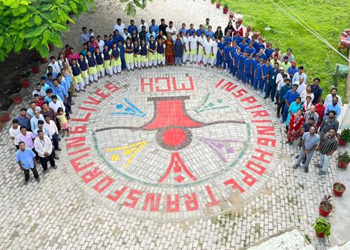
Not that long ago, EHA’s Madhipura Christian Hospital was considering closing its doors. Its district is one of the poorest, and there was rampant corruption and a strong caste system in place. The few patients who came in traveled on horseback since they had no cars or motorcycles. In this underdeveloped area, 63 percent of the people live in poverty.
But over time more staff members were added and the hospital grew. Five years ago they had just 70 people on staff, and now they have grown to employ 230 people. The team at Madhipura seeks to provide quality health care at an affordable cost. In the last year, they treated 37,400 outpatients and 3,800 inpatients. The staff delivered 1,270 babies and performed 1,118 surgeries.
If you feel led to support this hardworking hospital, please click the button in the top right corner of the page.
Overcoming Backward Thinking
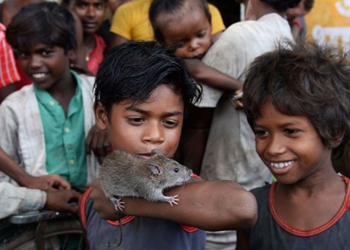
The staff at EHA hospitals deal with so much more than medical issues. They must constantly fight backward and oppressive ways of thinking, especially in rural areas. Here are a few vignettes from Madhipura Christian Hospital:
~ Harsha is part of the untouchables caste, also known as the rat-eaters. He is not allowed to attend school inside the building, but he may sit outside a window and listen. His father is not allowed to walk down the main road in their village.
~ Rachna gave birth to 13 daughters but refused to have her tubes tied. She knew she was of no value to her husband and he would leave her if she did not bear him a son. Rachna’s heart was not strong enough and she did not survive her 14th pregnancy. Her 13 daughters are now motherless.
~ Twelve-year-old Anima was brought into the outpatient department by her mother-in-law, who stridently exclaimed that Anima married her son 4 years before but there had been no baby yet. She demanded that Anima be examined to make sure she can bear children. This means, of course, that she married at the age of 8. In this area, it is not uncommon for girls of 18 or 19 to have already borne three children and had their tubes tied.
These prejudices and ways of thinking are ingrained in the villages surrounding Madhipura. It is a constant effort for the community workers to educate the people in healthier and more reasonable ways to think and act in order to improve their health and well-being.
Long-Term Care Saves Young Boy’s Leg
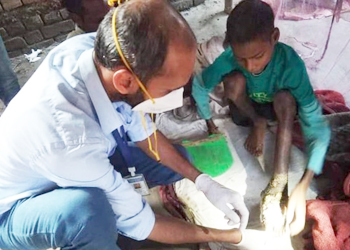
Eight-year-old Raja was working in a restaurant with his father when he injured his lower leg. He received minimal treatment before the pandemic hit and forced them to return to their rural village. There was no money for further treatment and his leg continued to worsen.
Raja’s village is one place where Madhipura Christian Hospital operates a health camp. Someone informed the staff that there was a boy whose wound needed dressing. The health team found Raja, isolated and malnourished and with a festering wound on his leg. They dressed his injury but recommended he be brought in to the hospital.
Once there, Raja was diagnosed with a tropical fungal infection called Madura foot, along with severe malnutrition. He was treated for three months at the hospital and then discharged after his mother was taught how to dress the wound. Raja is gaining weight and his leg and foot are slowly healing. Without the quick action and long-term care provided by Madhipura’s medical team, Raja would likely have lost his foot and possibly his life.
Freedom from Slavery and a Chance to Thrive
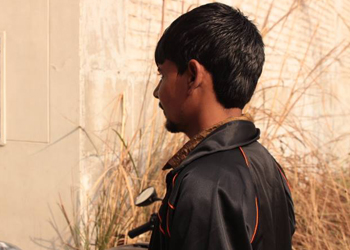
Pranav, though coming from the lowest caste, seemed to have a bright future. He was advancing steadily through school and received good grades. At 15, he and his family were optimistic about his future. Sadly though, his world was shattered when his mother fell ill. Upon learning of the expensive treatment required, a relative offered good pay if Pranav could come with him to work in a factory in a nearby city. With no other choice, his father sent him to work.
The promise of good money turned out to be false. Pranav worked long hours every day without receiving any pay. After six months, when he finally worked up the courage to ask for his dues, the owner beat him. Though he had fallen ill from the grueling labor, Pranav was still able to escape from this place and return home. As he was recovering, EHA’s community health staff visited his father, a farmer, to provide skills training.
After learning of Pranav’s situation, the community project was able to assist in funding his return to education. His father now makes more money with the new lessons he has learned, and his mother has also recovered from her illness. His family has a bright future because of the tremendous gift of Madhipura Christian Hospital’s community health staff.
Farming Innovation Protects the Vulnerable
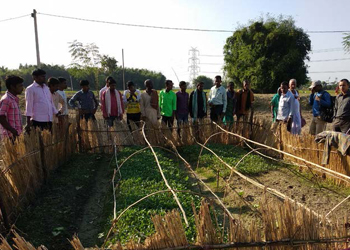
In the rural communities surrounding Madhipura Christian Hospital, unexpected expenses sometimes combine with low crop yield rates to produce devastating results. Many farm workers do not own land. Those that do usually have no more than an acre. As a result, it is typical for locals to work as day laborers on larger farms in the area. Because of this, most workers have no financial protection when the unforeseen occurs. Often, in the face of these vicious cycles, communities lose hope.
From natural disasters to health crises, life can present a host of trials, just as it does anywhere else around the globe. Left without any other options, many men develop mental illnesses and suicidal tendencies. To mitigate their financial distress, some families choose to migrate, opening themselves up to manifold risks. If the parents leave home to work in a city, their children are sometimes left without adequate supervision, creating vulnerable and dangerous situations.
Madhipura’s community health program has worked to create farming cooperatives that advance skills training for these local workers. Community health staff are able to help by enhancing efficiency and cutting out the middleman. By encouraging communal labor efforts, farmers are connected to a network of support when the inevitable droughts come.
Madhipura Christian Hospital has not only been successful in advancing the livelihood of farmers, but also in advocating for workers’ rights with local government agencies. Because of their work, the District Agriculture department is partnering with EHA to help advance best practices in the local farming industry.
Simple Surgery Brings a New Lease on Life
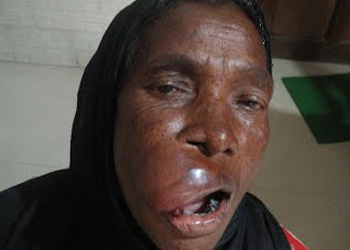
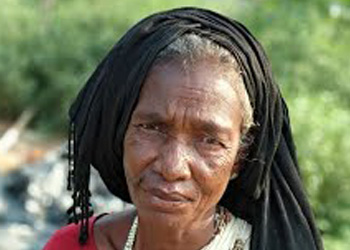
It had been ten years since Sheila had noticed the swelling on her upper lip. Now, the miserable growth defined her to many people in the community and interfered with her speech and eating.
She had tried having it treated at several medical facilities long ago, selling her land and livestock to pay for it. She even took out a loan, for which she was still making endless payments. Nothing had helped, and she reconciled herself to living with the swelling until it got the better of her.
The growth of the swelling was mercifully slow, but at this point she was basically waiting to die. The growth had begun to ulcerate and significantly interfere with her ability to eat. It was at this point that Sheila was pointed out to Madhipura Christian Hospital’s palliative care team. They immediately brought her in to the hospital where she underwent an excision of the swelling with no complications and an excellent cosmetic result.
Sheila has now recovered and rediscovered her beautiful smile which lights up her face each time she visits Madhipura. Her ability to speak better and eat comfortably has resulted in improved nutrition and quality of life. The scarf that once covered her face to hide her unsightly deformity is now used only for decoration. Thanks to the careful treatment of the medical staff at Madhipura Christian Hospital, Sheila has a new lease on life.
Twice Healed
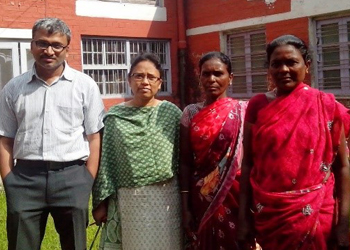
Kalyani had exhausted all her finances going to various doctors, but none of them were able to diagnose or cure her medical problem. Then she heard about EHA’s Madhipura Christian Hospital, and she went there, hoping that they would have answers for her. Kalyani had been suffering from increasing abdominal swelling, shortness of breath, and fever.
When the Madhipura doctors examined Kalyani using an ultrasound, she was found to have a large ovarian cyst. After they did a complete hysterectomy, her recovery was uneventful and she went home happily. However, that was not the last of Kalyani the medical staff would see.
Two months later she returned to the hospital complaining of vomiting accompanied by severe abdominal pain and distension. The EHA doctors determined that she had an intestinal obstruction. They encouraged Kalyani to travel to another medical facility to receive the surgery she needed, but her family clearly did not have the funds to do so.
As Kalyani’s situation worsened, they moved her to the ICU and told both her and her husband that they were praying to the great physician, God, on her behalf. They replied that they had faith that God would heal her. Kalyani prayed constantly. Her body slowly began to function normally again, and the obstruction passed without medical intervention. Everyone praised God for her healing.
Several months later at a Christmas function in one of the communities Madhipura reaches out to, Kalyani came over and tapped one of the doctors on the shoulder and asked if he remembered her. She was with her husband and sister, smiling and healthy. This was just one more example of God healing someone with faith the size of a mustard seed.
New Community Center Under Construction
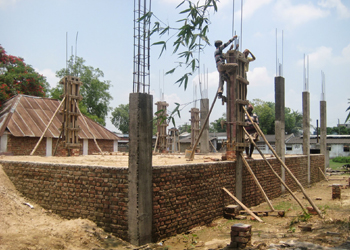
The dream is becoming a reality. Desiring to provide many kinds of training to various groups, Madhipura Christian Hospital (MCH) is constructing a community center. With a capacity to hold 100 people and house guest speakers, this new building will serve a much needed function for MCH.
The Community Health Department of MCH is taking the lead in training local people in everything from preparing for natural disasters to better ways to farm. They conduct an average of 20 to 25 group trainings each year. One new concept is called the System of Rice (or Wheat) Intensification, and it provides farmers with a method to drastically increase their yield. With basic needs such as food and housing being a priority for most villagers, this training can make the difference between going hungry and being healthy.
Staff from MCH spent a year working with architects on the layout and design of the structure. Construction is progressing well. Funds for this project have been provided by EHA Australia.
Premature Baby Boy Is Saved
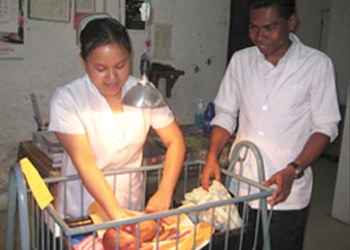
Mrs. M. was wheeled into the emergency room at Madhipura Christian Hospital in severe distress. In the throes of labor, she was in just her seventh month of pregnancy. Due to the care of the doctors and nurses, she delivered a live baby boy who weighed only 700 grams (24 ounces). The baby was taken to the nursery and administered intravenous fluids and antibiotics. In spite of careful care, he began losing weight, and on the fourth day, the mother’s relatives insisted that he be discharged. The father had deserted the mother and her relatives were unable to afford care for the baby. After hospital staff discussed that they would waive the expenses and continue to care for the child, the relatives relented.
Meanwhile, the baby’s weight dropped to 450 grams, but the clinical team and the nurses persistently took care of all of the complications and urged the mother not to lose hope. In the 40 days that the baby was in the hospital, he developed multiple complications, including neonatal sepsis (bacterial infection in the blood), hypocalcemia (low blood calcium levels), hypokalemia (low blood potassium levels), and hypothermia (low body temperature). The nurses determinedly cared for the baby, and he began to gain weight. By the time of his discharge, he had gained almost 1,500 grams and was doing well. We praise God for his faithfulness to this mother and son through the diligence of the Madhipura Christian Hospital nursing staff. They understand that each life is precious and worth saving.
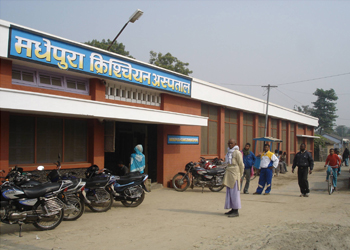
About Madhipura Christian Hospital
In January of 1915, four missionaries from the Brethren in Christ Church in the United States arrived in Madhipura in the northeast part of Bihar and began their mission work. They purchased the Madhipura Mission House for only 500 rupees from the railway company.
Disaster struck in 1924 when excess rains caused the destructive backwaters of the Kosi River to sweep away most of the roads, forcing the missionaries to abandon this mission field. In 1939, two missionaries from the same church, Brother and Sister Engle, returned to restart the mission work at Madhipura. It was at this point that the missionaries saw the great need for health services in the community of Madhipura and began treating patients themselves.
Desiring to support the medical work at Madhipura, the US Brethren in Christ mission board sent Dr. George Paulus and his wife in 1953 to start a one-room dispensary. Three nurses from the Brethren in Christ mission soon joined him. In 1959, Dr. L.D. Mann joined the team and grew the facility to a 10-bed unit with a tuberculosis ward. By 1969 the number of beds had grown to 20 and Dr. Henry Kreider joined the team.
Madhipura Christian Hospital joined the Emmanuel Hospital Association in 1974. Again in 2008 the district of Madhipura was ravaged by flooding and the hospital was closed temporarily, while still being able to be involved in the flood relief work.
Reopened in 2009, the outpatient and inpatient departments were renovated completely, and a Community Health and Development Department was started. Two recent improvements at Madhipura include a new nursery constructed in 2010 and a water purification project completed in 2011.
The focus of the hospital today includes surgery, general medicine, obstetrics and gynecology, and eye services. They operate 43 rural clinics and run 45 self-help groups. They strive to serve their patents, not just with medical care, but with holistic care, showing the love of God in words and deeds.
